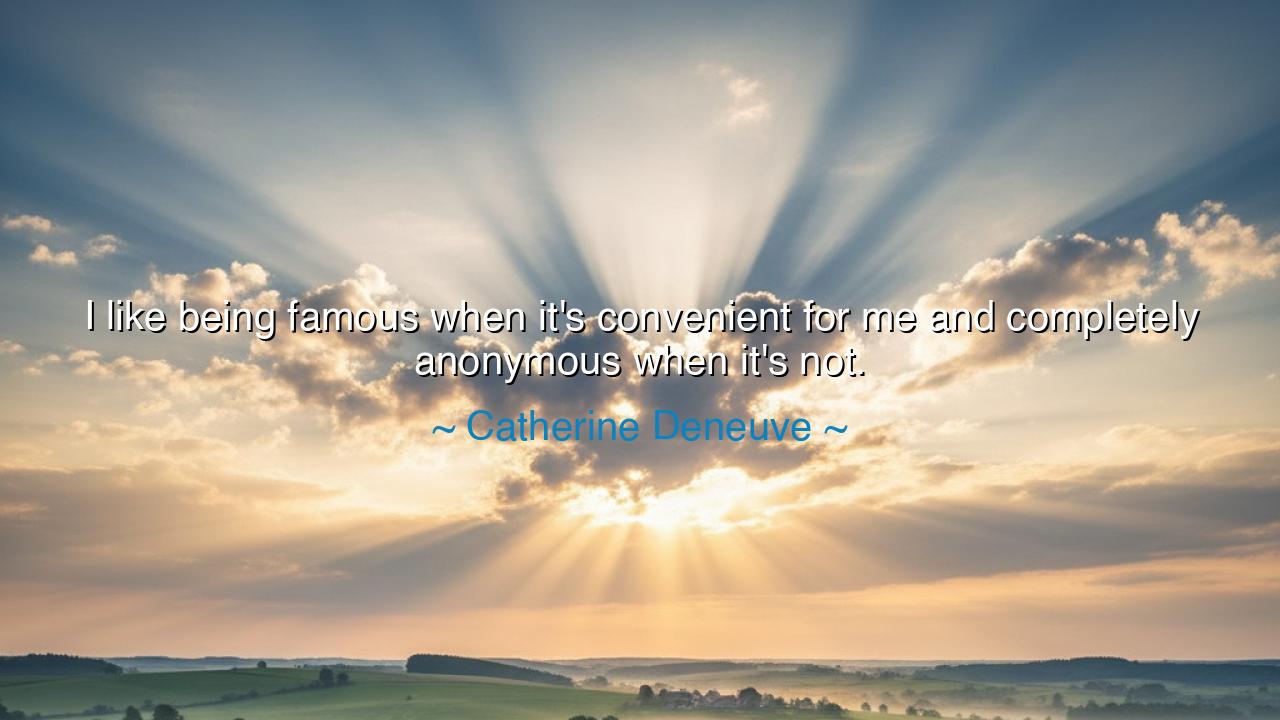
I like being famous when it's convenient for me and completely
I like being famous when it's convenient for me and completely anonymous when it's not.






Host: The stillness of the evening surrounded the room, the soft glow of the lamp casting a peaceful light. Jack sat at the table, his fingers lightly resting on the edge of his cup, reflecting on Catherine Deneuve's words. Jeeny stood near the window, her arms loosely crossed, looking out at the street as she absorbed the balance of Deneuve's perspective.
Jeeny: “I’ve been thinking about what Catherine Deneuve said: ‘I like being famous when it’s convenient for me and completely anonymous when it’s not.’ It’s such an interesting take on fame, isn’t it? The way she describes wanting to control when she’s in the spotlight and when she’s not. It feels like she’s saying that fame, like everything else, is something to be managed—used when it benefits her, but set aside when it doesn’t.”
Jack: “Yes, exactly. Deneuve is showing us that fame isn’t a one-size-fits-all experience. It’s not about being constantly in the public eye or being constantly out of it. It’s about choosing when to engage with it, when to embrace the benefits of recognition, and when to retreat into privacy. I think a lot of people think fame is this permanent, overwhelming thing, but she’s saying it’s actually something more fluid, something that can be controlled.”
Jeeny: “Right. It’s almost like she’s finding a way to take back control over her own narrative, over her relationship with the public. So many people see fame as something that controls them, as something they can’t escape, but she’s saying that she gets to decide when it’s useful and when it’s too much. It’s about having the agency to decide how you interact with the world and when you step back.”
Host: The quiet in the room deepened as they reflected on how fame shapes people’s lives in ways that are often unseen. Jack’s fingers stopped moving on his cup, while Jeeny’s gaze softened, reflecting on the need for boundaries in the face of constant attention.
Jack: “It makes me think about how fame can often be this double-edged sword. On one hand, it can open doors, give people opportunities, or make them feel seen. But on the other hand, it can be suffocating, intrusive, and take away your privacy. What’s powerful about Deneuve's words is that she doesn’t just accept fame as a force that controls her. She’s actively curating her experience, choosing when to step into the spotlight and when to retreat.”
Jeeny: “Exactly. I think Deneuve is really talking about the human need for balance. We all need space to be ourselves, to live without the pressure of the world watching. Fame can be exciting, even rewarding, but it can also be isolating. The ability to be anonymous, to step away from the public eye when it’s not serving you, is just as important as the moments when fame brings you connection or opportunity.”
Jack: “Yes, it’s about boundaries. Fame doesn’t have to define you—it’s part of your life, but it shouldn’t be your entire life. Deneuve is showing us that it’s okay to want both—moments of visibility and moments of retreat. It’s about finding a way to navigate fame in a way that feels authentic to who you are.”
Jeeny: “And that’s what makes her perspective so relatable. It’s not about rejecting fame altogether or embracing it fully—it’s about managing it, deciding when it works for you and when you need to step back. It’s a reminder that we all have the right to define how we interact with the world, no matter what role we play in it.”
Host: The stillness in the room grew deeper as they considered the delicate balance between public life and private life, and how Catherine Deneuve’s words reminded them that fame doesn’t have to overwhelm us. It’s a tool, one that can be wielded with intention, used when it’s useful and set aside when it isn’t. Jack leaned back slightly in his chair, while Jeeny’s gaze softened, both of them understanding the complexity of fame and the need for boundaries.
Jack: “So, Deneuve is really showing us that fame doesn’t have to be all-consuming. It’s about choosing when to engage with it and when to let it go, when to be seen and when to be anonymous. It’s a way of maintaining control over your own narrative.”
Jeeny: “Exactly. It’s about having the agency to decide how fame fits into your life, not letting it dictate who you are or how you live. Deneuve is reminding us that we can take the best parts of fame, but we also have the right to protect ourselves from the parts that feel too intrusive or overwhelming.”
Host: The evening had fully settled in, the quiet understanding between them a reminder that fame is not something to be feared or chased—it’s something that can be managed and navigated with intention. Catherine Deneuve’s words had shown them both that the key to living with fame is finding the right balance, knowing when to embrace it and when to step away. The world outside had darkened, but inside, there was light—a recognition that we all have the right to define our relationship with the world, including how we interact with fame.






AAdministratorAdministrator
Welcome, honored guests. Please leave a comment, we will respond soon